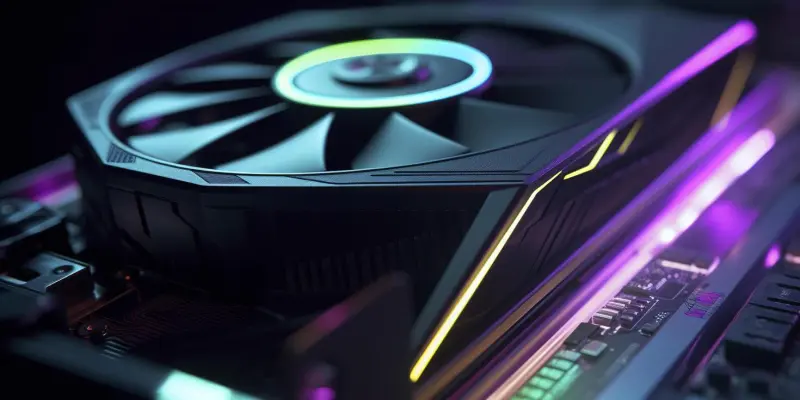NVIDIA made waves in the gaming community today with the announcement of their latest addition to the RTX 50 series—the GeForce RTX 5060 Ti. Aimed at redefining the landscape of entry-level 1440p gaming, the RTX 5060 Ti enters the market with two distinct models. The 16 GB VRAM variant is priced at $429, while the 8 GB VRAM version is available for $379. Powered by the innovative Blackwell GB206 GPU architecture, these new graphics cards blend advanced features with a significant performance boost, positioning themselves as a cost-effective solution compared to previous models.
Performance and Technological Advances
Target Audience and DLSS 4 Capabilities
The GeForce RTX 5060 Ti targets mainstream gamers who might still be using older GPU architectures such as Pascal (10 Series), Turing (20 Series), and Ampere (30 Series). This is an audience of over 50 million gamers, and the new RTX 5060 Ti promises to provide up to 50 times greater graphics performance than older models like the GTX 1060 or GTX 1660, thanks largely to DLSS 4 technology. With DLSS 4’s Transformer model, the 5060 Ti significantly enhances image quality, reducing latency and boosting performance in popular AAA games, including Hogwarts Legacy and Cyberpunk 2077. DLSS 4 introduces several groundbreaking features that stand out from previous iterations. It leverages advanced machine learning algorithms to accurately predict a high-resolution frame from a lower-resolution base, thus ensuring both high performance and impressive visual fidelity. This technology is not limited to just reducing computational load but also enhances the overall stability and reliability of frame rates under graphically intensive scenarios, which is of great importance to competitive gamers and content creators alike.
Core Specifications and Architectural Improvements
The GeForce RTX 5060 Ti boasts a comprehensive array of specifications designed to deliver superior gaming experiences. Key specifications include 4608 CUDA cores distributed across 36 SMs, 24 TFLOPs of shading performance, 759 AI TOPS, and 72 TFLOPs of RT performance. These powerful features are complemented by a 128-bit memory bus utilizing the latest GDDR7 memory standard, which significantly bolsters memory performance. The GPU also offers clock speeds of 2.4 GHz for the base and an impressive 2.57 GHz for the boost, all within a manageable 180W TDP. Memory performance sees a marked improvement, with both 16 GB and 8 GB variants achieving 448 GB/s bandwidth. This represents a 55.5% increase over the previous RTX 4060 Ti, enabling smoother gameplay and better handling of high-resolution textures. The inclusion of PCIe Gen5 x8 protocol and extensive display capabilities, such as support for up to 4K at 480Hz or 8K at 165Hz, underline the 5060 Ti’s versatility not just in gaming, but in high-definition video processing and professional applications.
Comparative Analysis and Market Impact
Enhanced Features Over Previous Models
When compared to its predecessor, the RTX 4060 Ti, the RTX 5060 Ti reveals a series of enhancements. There is a 5.8% increase in CUDA cores, yielding up to 20% higher performance in rasterization tasks. This is coupled with the utilization of faster GDDR7 memory, which ensures an upgrade in bandwidth. Interestingly, the RTX 5060 Ti models are also more affordable: $20 less for the 8 GB model and $70 less for the 16 GB model, thus making advanced gaming technology more accessible to a broader audience.
These improvements are crucial for gamers who demand high frame rates and detailed graphics in modern games. The jump in peak clock speeds directly translates to better performance during high-intensity scenes, a frequent requirement in graphically demanding titles. Additionally, the enhanced AI capabilities offer remarkable benefits for applications beyond gaming, including real-time rendering and complex simulations, which rely heavily on GPU performance.
Upcoming RTX 50 Series Prospects
NVIDIA has also provided preliminary specifications for other upcoming GPUs in the RTX 50 series, indicating a wide range of options in terms of GPU cores, clock speeds, memory capacities, and power requirements. Prices will span from $1999 for the high-end RTX 5090 to $199 for the entry-level RTX 5050. This hints at NVIDIA’s strategy to cover various segments of the market, appealing to both high-end enthusiasts and budget-conscious consumers. The introduction of the 5060 Ti within this broader strategic framework suggests its role as a cornerstone product designed to demonstrate the capabilities of the RTX 50 series. By bringing advanced gaming features and significant performance gains at a lower price point, NVIDIA aims to solidify its position in a competitive market. The 5060 Ti’s ability to deliver cutting-edge technology with minimal financial strain on consumers highlights its importance in NVIDIA’s product lineup.
A Leap Forward for Mainstream Gaming
NVIDIA created quite a buzz in the gaming world today with the introduction of their newest member in the RTX 50 series lineup—the GeForce RTX 5060 Ti. This graphics card aims to revolutionize the entry-level 1440p gaming experience. The RTX 5060 Ti launches with two different models to cater to varying needs and budgets. The version with 16 GB of VRAM is set at a price tag of $429, while the 8 GB VRAM variant is available for $379. Both models are powered by the cutting-edge Blackwell GB206 GPU architecture, offering a blend of advanced features and a remarkable boost in performance. This latest release positions the RTX 5060 Ti as a cost-effective solution, appealing to gamers who seek both value and high performance. The new architecture is designed to deliver faster processing and improved graphics quality, making it an attractive option for those who want an exceptional gaming experience without breaking the bank. By offering these features at competitive prices, NVIDIA continues to solidify its hold on the gaming market, promising an exciting future for gamers everywhere.

